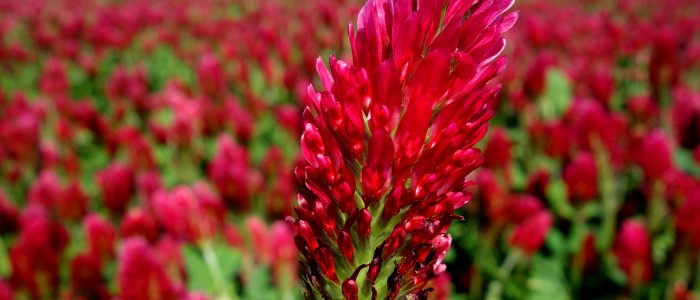-
 Turf Grass Seed Bluegrass, Bentgrass, Ryegrass, Fescues...
Turf Grass Seed Bluegrass, Bentgrass, Ryegrass, Fescues...
-
 Forage Seed Bromes, Clovers, Fescue, Wheatgrass, Legumes
Forage Seed Bromes, Clovers, Fescue, Wheatgrass, Legumes
-
 Grains Wheat Grain, Rye Grain
Grains Wheat Grain, Rye Grain
-
 Cover Crop Seed Buckwheat, Clover, Peas, Ryegrain
Cover Crop Seed Buckwheat, Clover, Peas, Ryegrain
-
 Wildflower Seed Mixtures, Singles, Annual, Perennial
Wildflower Seed Mixtures, Singles, Annual, Perennial
-
 Sprouting Seeds Fully certified Non-GMO Organic seeds for sprouts or microgreens
Sprouting Seeds Fully certified Non-GMO Organic seeds for sprouts or microgreens
Crimson Clover Non-GMO Sprouting Seeds
Crimson Clover (Trifolium incarnatum) is about 3x bigger than red clover (seed and sprout). It produces a delicious crunchy, leafy sprout with dark green leaves and white shoots. It’s easy to grow and very similar to alfalfa sprouts in flavor and texture. A favorite among sprout lovers.
Seeding Rate:
Indoor: 1.5 Tbsp. / 10”x 20” tray
Outdoor: 20-25 lbs. / per acre
How to Grow: Soak seeds for 4-6 hours and drain. Rinse 2-3x/day for 4-6 days and drain thoroughly after each rinse. If grown in trays, plant in fertile, well-drained soil at a depth of at least 1/8” with temperatures between 50°F to 75°F under minimal sunlight. Keep the soil moist, but avoid overhead watering. Harvest when the seedlings are about 3-4” tall.
Cover Crop: If sown in the fall and tilled back, Crimson Clover will add nutrients to the soil for spring crops. Can be sown in spring as a companion crop to naturally add nitrogren, improve soil tilthe, and suppress weeds. Plants emerge quickly and withstand heavy spring rains. Crimson Clover is also frost tolerant. It is a beautiful and beneficial cover crop for gardens or pastures.
Nutritional Value: Sprouting seeds are richer in protein, folate, magnesium, phosphorus, manganese and vitamins C and K than un-sprouted plants. The vitamin and mineral content varies based on the variety of the sprouting seeds. Sprouts offer a powerful source of vitamins, minerals, antioxidants, and enzymes that fight free radicals because sprouting can increase their potency by 20 times or more.

